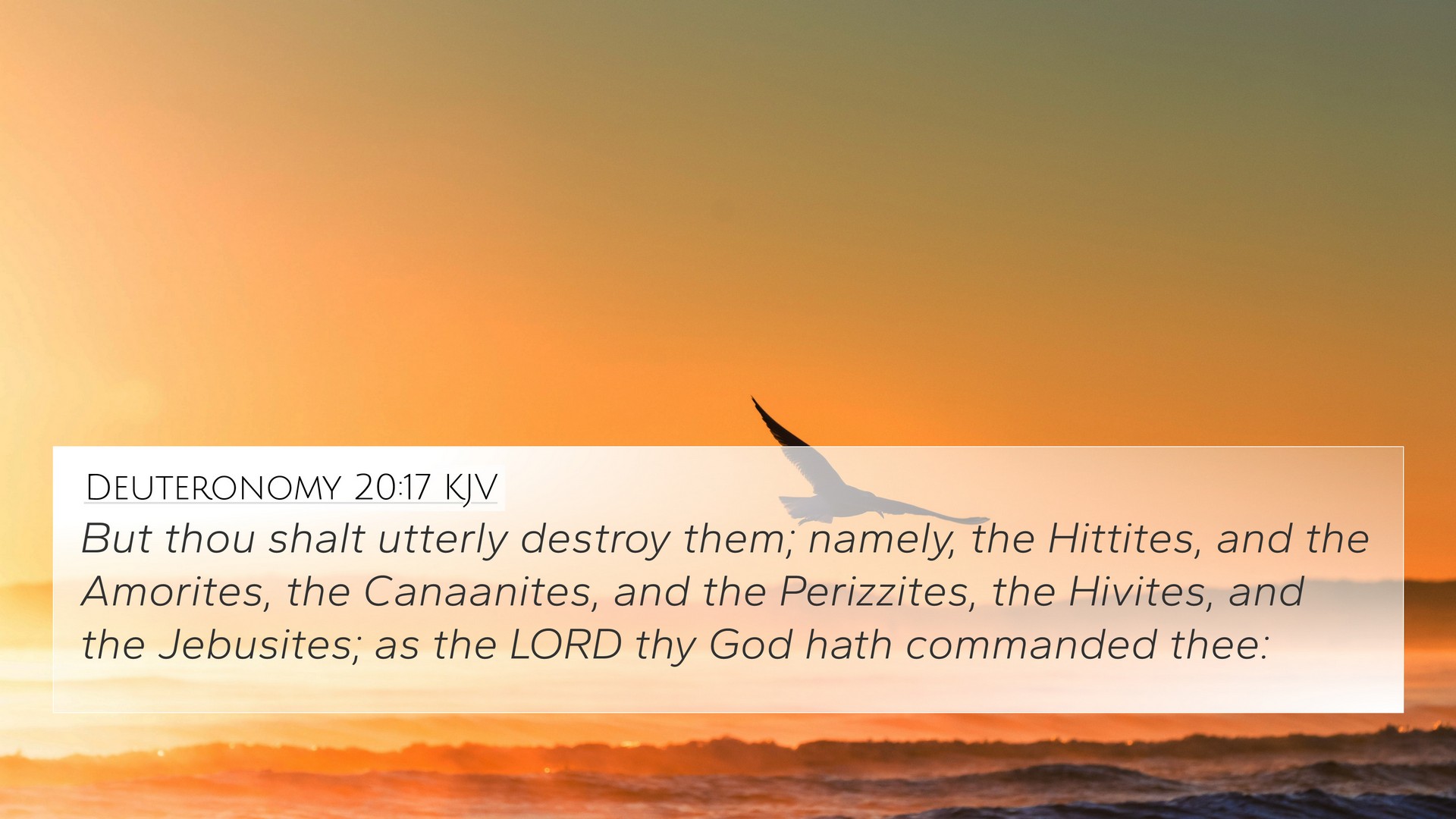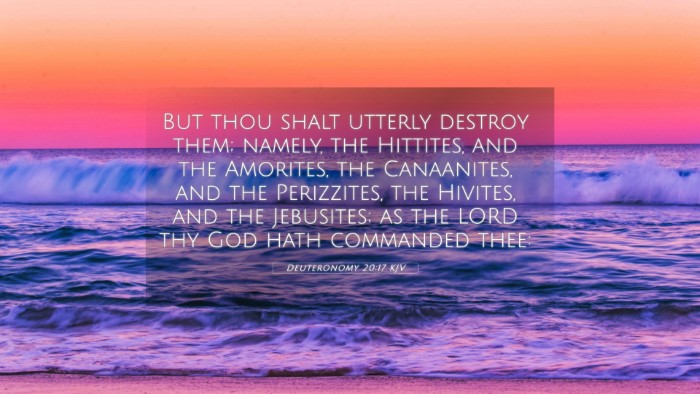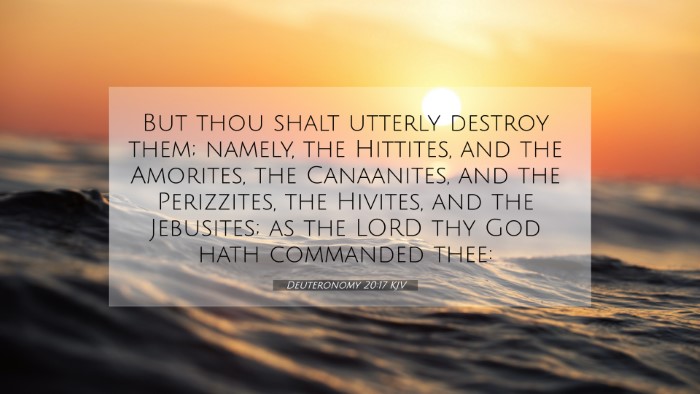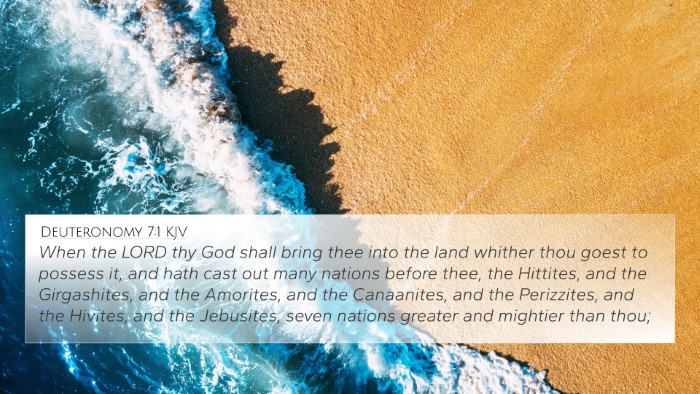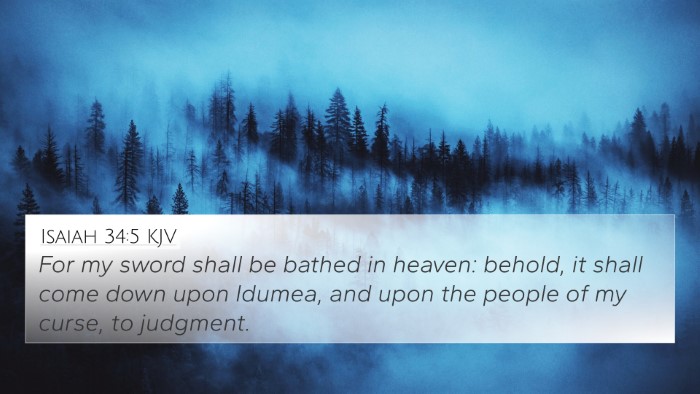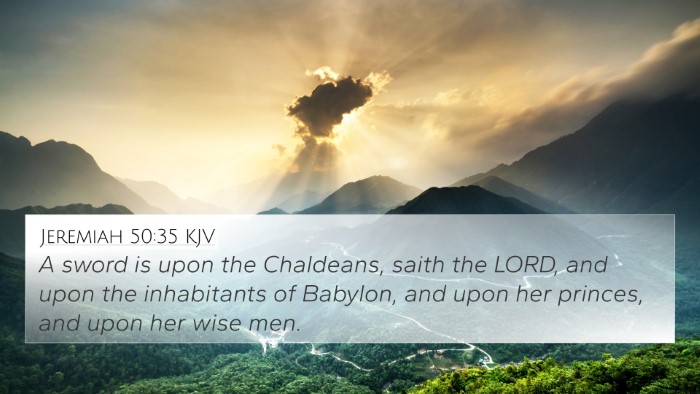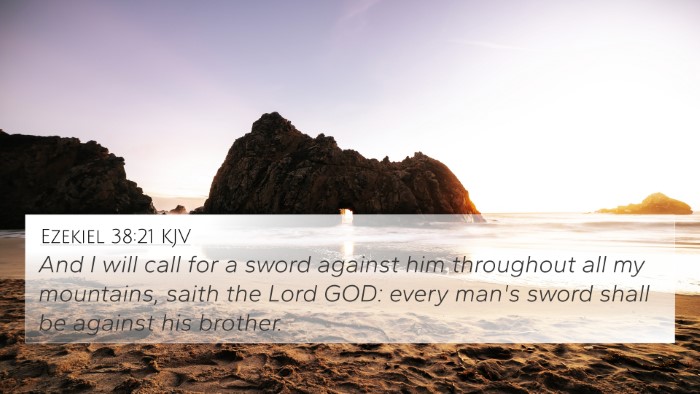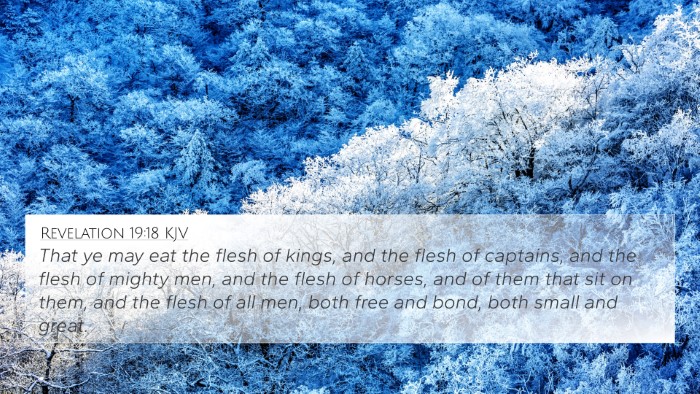Understanding Deuteronomy 20:17
Deuteronomy 20:17 states, "But you shall utterly destroy them, the Hittite and the Amorite, the Canaanite and the Perizzite, the Hivite and the Jebusite, as the Lord your God has commanded you." This verse represents a significant directive from God to the Israelites concerning the conquest of Canaan, demanding total destruction of the inhabitants. Below, we will explore the meanings of this verse drawn from several public domain commentaries and establish connections with other relevant Bible verses.
Verse Interpretation
The message embodied in Deuteronomy 20:17 communicates God's call for the Israelites to cleanse the land of those peoples who had engaged in practices that were deemed abhorrent. Matthew Henry's commentary emphasizes the seriousness of this command, stating that the dispossession of these nations symbolizes the removal of sin from the lives of believers. For Henry, the extermination of these tribes is not just historical but serves a deeper moral purpose in illustrating the necessity of obliterating the sinful elements in one’s life and society.
Similarly, Albert Barnes highlights the historical context, noting that these nations represented a significant moral and spiritual pollution. He argues that God’s instruction reflected His righteous judgment over the wickedness prevalent in those cultures. Barnes indicates that the eradication of these peoples points towards God’s protection for His chosen individuals and the establishment of a holy nation.
Adam Clarke further elaborates on the cultural and religious implications of this command. His analysis suggests that while such directives might appear severe, they underline the covenant relationship between God and the Israelites, where obedience to God’s commandments and separation from corrupt influences is vital to their identity as a nation. Clarke refers to this command not as mere violence but as a call to holiness.
Cross-References to Deuteronomy 20:17
To understand the broader themes and implications of Deuteronomy 20:17, it is essential to explore the following Bible verses that provide context and enhance understanding:
- Exodus 23:24: "You shall not bow down to their gods, nor serve them; nor do according to their works; but you shall utterly overthrow them and completely break down their sacred pillars."
- Numbers 33:52: "Then you shall drive out all the inhabitants of the land from before you, and destroy all their engraved stones, destroy all their molded images, and demolish all their high places."
- Joshua 6:21: "They utterly destroyed all that was in the city, both man and woman, young and old, ox and sheep, and donkey, with the edge of the sword."
- 1 Samuel 15:3: "Now go and attack Amalek, and utterly destroy all that they have, and do not spare them. But kill both man and woman, infant and nursing child, ox and sheep, camel and donkey."
- Psalm 106:34-35: "They did not destroy the peoples, concerning whom the Lord had commanded them, but they mingled with the Gentiles and learned their works."
- Deuteronomy 7:1-2: "When the Lord your God brings you into the land which you go to possess, and has cast out many nations before you... you shall utterly destroy them."
- Matthew 22:37-39: "Jesus said to him, 'You shall love the Lord your God with all your heart, with all your soul, and with all your mind' - indicating the spiritual parallel of devotion and seclusion from idolatry."
Thematic Connections and Cross-Referencing
The thematic connections between Deuteronomy 20:17 and cross-referenced scripture highlight the overarching narrative of God's holiness and the call to purity among His people. These links assist in a more profound understanding of God’s intent and character in the historical context.
- The Call to Holiness: Leviticus 20:26, "And you shall be holy to Me, for I the Lord am holy..." parallels with the call for the Israelites to separate themselves from corrupt influences.
- Judgment on the Wicked: 2 Peter 2:6, "and turning the cities of Sodom and Gomorrah into ashes, condemned them to destruction..." shows the patterns of God’s judgment against unrepentant sinners.
- Faithfulness to God's Commands: Deuteronomy 11:8-9 emphasizes the importance of obeying God's commandments to prosper in the land.
Comparative Bible Verse Analysis
When engaging in comparative Bible verse analysis, one can draw parallels between Deuteronomy 20:17 and New Testament principles that advocate for repentance and separation from sin. The destruction commanded in the Old Testament is akin to the New Testament call to sanctification.
- Romans 12:2: "And do not be conformed to this world, but be transformed by the renewing of your mind..." underscores the same maxim of spiritual separation.
- 1 John 2:15: "Do not love the world or the things in the world..." echoes the command to avoid the influences of the surrounding cultures that lead one away from God.
Conclusion
In summary, Deuteronomy 20:17 is a command that is rooted deeply in the holiness of God and the need for His people to remain separate from moral and spiritual decay. By referencing other verses, believers can see a unified theme throughout Scripture regarding the importance of holiness, obedience, and divine judgment. These connections enhance one’s biblical understanding and highlight the significance of God's Word as an ethical and spiritual guide for maintaining the identity He desires for His people.
